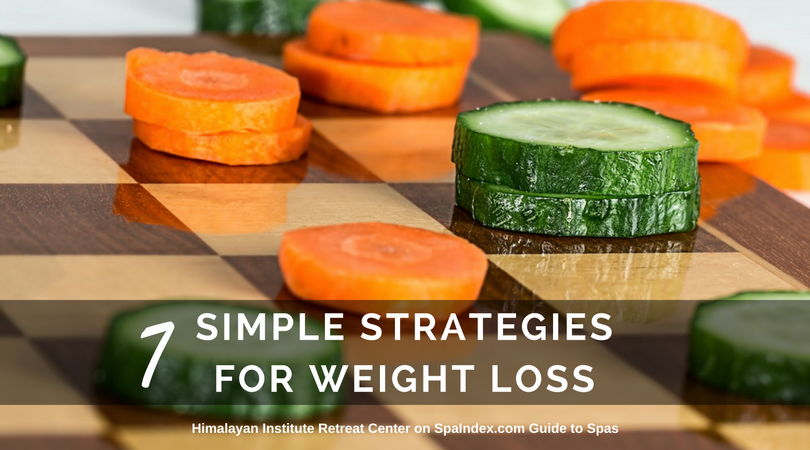7 Simple Strategies for Weight Loss in the New Year

I have avoided writing about weight loss for years because of our culture’s obsession with thinness. I never wanted to contribute to our societal self-condemnation for not being perfect. But as more and more of my patients come to me struggling to achieve or maintain a healthy weight, or dealing with the detrimental health effects of excess weight (see The Obesity Epidemic and Its Effects on Our Health below), I am compelled to write!
My general approach to patients is to promote self-love, self-acceptance, and healthy lifestyle habits that support our inherent good health and peace of mind. This strategy can result in weight loss without me harping about it—because loving ourselves is at the core of good self-care—along with education and determination.
Most of us are overloaded with information on what we need to do to lose or maintain a healthy weight. With the hope of providing an easy starting place to refocus and renew your commitment to make healthy lifestyle choices, I have listed 7 simple guidelines below. These are meant to be pointers, not rules, and I have focused on the ones that have been found to make the biggest impact when it comes to achieving a healthy weight, and maintaining it.
EAT GOOD FOOD -- NOT TOO MUCH
It matters that we eat vegetables, fruits, wholesome protein sources (dairy, eggs, poultry, and fish) and whole grains—most of the time. There is still room for holiday specialties or party favorites, but they should be just the tip of the food iceberg (or the icing on the cake, but not the whole cake). Portion control is the mainstay of weight management, try using a smaller plate, or having half as much as you might want (or just 2 bites) and reassess your hunger later.
MOVE MORE
We’ve heard this over and over—and it’s true. Exercise burns up calories, increases metabolic rate, strengthens our bones and immunity, and improves mood. It doesn’t have to take a lot of time either; 30 minutes most days is becoming the mantra for good health. We’ll be more likely to continue exercising if it’s enjoyable—so find a friend, take a class, and shake that booty! Remember that even those small things, like parking farther from the entrance and taking the stairs instead of the elevator, all add up. Get a pedometer if you are curious about how many steps you actually take a day.
STAY HYDRATED
A recent study by Obesity: A Research Journal shows that simply staying more hydrated by drinking 500 ml (that’s just over 2 cups) of water 30 minutes prior to the main meal helped folks lose more weight than those who just drank normally. While another study in 2010, showed greater weight loss when 500 ml of water was consumed 30 minutes before every meal compared to those who just ate the same diet.
Why is this so? Sometimes we are thirsty and don’t know it and eat instead of drink. Water consumption makes us feel full, so we skip a snack, and it decreases hunger so we eat less. All good! (I am walking to the water cooler now.)
SUPPORT YOUR GUTS
By now you’ve probably heard of the “microbiome,” which are all the microscopic organisms that live in and on the human body. The majority of these are in the intestinal tract and it turns out they are doing a lot more than helping us digest our food. New studies show that the types of microorganisms we have in our guts can actually influence whether we become thin or fat. Studies show that when the guts of lean mice are colonized by the microbiota from fat mice, the lean mice gain weight. The microbiome in overweight people is less diverse (which means, less healthy), which somehow (we don’t know how yet) favors weight gain and thwarts weight loss. When overweight people are put on calorie-restricted diets and exercise programs, they lose weight and their microbiome changes to have more diversity.
This is an area of growing interest, and so far there is no clear treatment for obesity using this information in clinical practice. However, it certainly makes sense to include foods in your diet that contain healthy bacteria: cultured yogurt, real sauerkraut, kombucha, miso, kefir, and kimchi are all good.
CALM AND EXPRESS YOUR EMOTIONS
Emotional eating is hardwired in us: babies nurse when they are tired, upset, or in pain—not just when they are hungry. As adults, we tend to do the same thing. In our quest for emotional comfort, we eat yummy (usually cheesy, bready, oily, sweet, or salty) things. They don’t solve our problems, but momentarily they are calming. While (of course) some emotional eating is OK, expressing emotions rather than dulling them is preferred. Talking with a friend or a counselor, journaling, emoting without violence (i.e., primal scream therapy), physical movement or exertion (punching pillows, jogging), and all forms of art and expression can help process our complex emotional reactions. We all benefit from taking the time to feel and understand ourselves.
KEEP GOOD COMPANY
Weight loss is easier in a group. Multiple studies show that those folks in an organized weight loss group (like Weight Watchers) lose more weight than those who are doing it solo. Even programs (like Fitbit or MyFitnessPal) that connect you to others with similar goals are helpful. We all need someone cheering us on!
POINTS TO REMEMBER
In this crazy, stressful, too-much-fast-food world, do your best to make healthy choices that support you in being your best self. Honor your talents and abilities, and appreciate your goodness. Make goals that are realistic and attainable, but don’t criticize yourself for not reaching them immediately. Change takes time—you are a work in progress.
- Do your best to eat whole, unprocessed foods.
- Drink 2 cups of water half an hour before meals.
- Move your body (ideally in an enjoyable way) for 30 minutes most days.
- Decrease stress: spend 5 minutes twice a day breathing deeply to relax your nervous system; consider a yoga class, singing, painting, exercise, massage, etc. . .
- Eat fermented foods as much as possible.
- Find healthy ways to express your emotions.
- Enlist others to support your efforts!
In case you didn’t know, about two-thirds of the US population is overweight or obese. These conditions are associated with higher risks of many diseases, such as:
- High blood pressure
- Heart disease
- Stroke
- Diabetes
- High cholesterol
- Metabolic syndrome
- Osteoarthritis
- Gall bladder problems
- Sleep apnea
- Some cancers (colon, breast, endometrial, and gall bladder).
Most of these are very serious conditions: heart disease is he most common cause of death throughout the industrialized world. Many of these ailments create other problems too; for example, diabetes can cause kidney failure and blindness, and most predict a less happy life, and unfortunately, an earlier death.
As a society, we need to look at how we are feeding ourselves, and what we need to do to quell this rising trend.
ABOUT PURE REJUV and the HIMALAYAN INSTITUTE RETREAT CENTER
Carrie Demers M.D. has practiced integrative medicine for 22 years. After earning her medical degree and becoming board-certified in Internal Medicine, Dr. Demers went on to study massage, homeopathy, yoga, meditation, nutrition, herbal medicine, and Ayurveda. She uses all these modalities to support patients’ inherent ability to heal.
Dr. Demers sees patients, writes articles, and lectures nationally on integrative medicine. She is board-certified in Integrative medicine, and has been the Medical Director of PureRejuv Wellness Center at the Himalayan Institute Research Center in the Poconos of Pennsylvania or the last 20 years.

